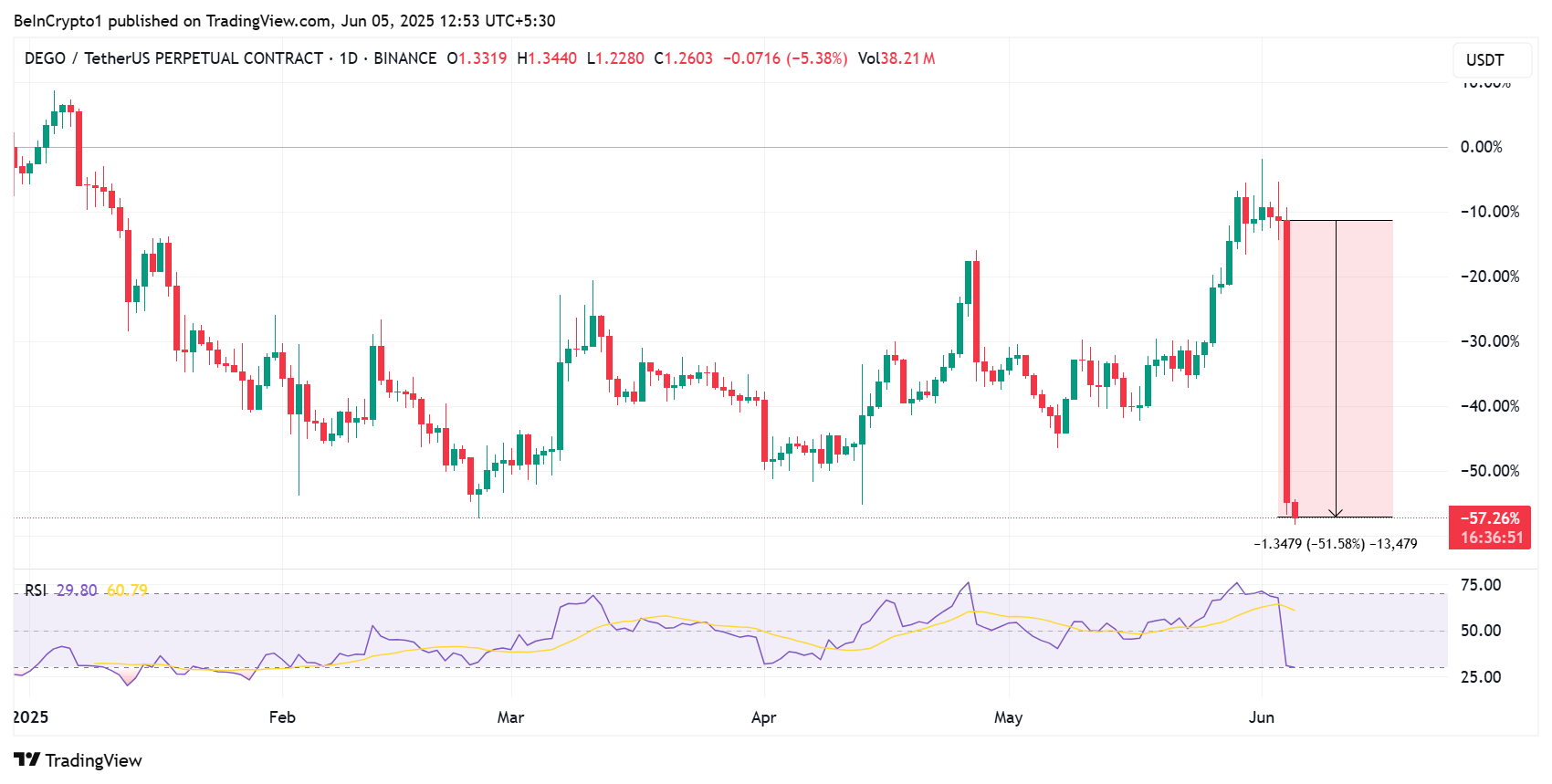 Sometimes the difference between security and compromise comes down to a single click – and a healthy dose of suspicion. And it’s because scammers are getting increasingly sophisticated with their phishing attempts. It’s to the point where even following standard security best practices isn’t enough to protect you. Case in point: last week’s near-successful phishing attack on Zach Latta.
Sometimes the difference between security and compromise comes down to a single click – and a healthy dose of suspicion. And it’s because scammers are getting increasingly sophisticated with their phishing attempts. It’s to the point where even following standard security best practices isn’t enough to protect you. Case in point: last week’s near-successful phishing attack on Zach Latta.
Related Posts
Dego Finance Crashes 60% as USD1 Liquidity Initiative Sparks FUD
Dego Finance (DEGO) price took to a free fall amid community FUD (fear, uncertainty, and doubt) following an announcement on Wednesday, June 4.
The announcement involved USD1 stablecoin, launched by the Trump family’s World Liberty Financial.
DEGO Price Drops 60%: What Caused The Crash?
The DEGO price, the native token of Dego Finance, dropped nearly 60% following the project’s announcement that it would support USD1, a stablecoin by World Liberty Financial (WLFI), as part of a new liquidity initiative on the BNB Chain.

“We’re officially purchasing $USD1 World Liberty Financial as a liquidity reserve and supporting the liquidity program launched by World Liberty Financial (WLFI) on BNB Chain. This move reflects our commitment to building a stronger DeFi ecosystem — and exploring deeper collaborations with USD1 as we assemble the decentralized LEGO of Web3,” read the announcement.
The team framed the move as a strategic step to strengthen DeFi infrastructure. Notwithstanding, the market reaction was swift and brutal.
DEGO’s price collapsed, and the Relative Strength Index (RSI), a momentum indicator, dropped to oversold territory.
This drop suggests fear and confusion among holders. Some community members supported the rationale behind the decision, but acknowledged why the move was concerning.
“Team adding liquidity of DEGO on USD1 allows users to trade DEGO with a stablecoin, improving market access and price stability… by chance this liquidity creates FUD,” one user noted.
In crypto, adding liquidity typically means providing a pool of assets, such as DEGO paired with USD1 to a decentralized exchange (DEX) to facilitate trading.
This should make it easier for users to buy and sell DEGO without relying solely on other volatile cryptos, potentially stabilizing its price. However, several factors likely contributed to the FUD.
Among them is that more than half of USD1’s liquidity on PancakeSwap DEX comes from just three wallets, raising questions about “real demand.” BeInCrypto reported that three wallets hold 93% of its market cap.
If USD1 itself lacks organic usage and is propped up by a few large players (likely market makers or the team behind it), this could create skepticism among DEGO investors.
Therefore, investors might worry that the liquidity pool for DEGO/USD1 is artificial or manipulated. Such concerns could lead to uncertainty about the true value of DEGO.
The market perceives that USD1 is not widely adopted or trusted, making pairing DEGO with it a risky or questionable move, hence the FUD.
Dego Finance Assures Community Amid Panic
Against this backdrop, there are concerns that DEGO may be a scam project, highlighting growing distrust among certain retail investors.
Addressing community fears, Dego Finance released an official statement on Thursday, June 5, following a sharp selloff to calm investor nerves.
“We’re aware of the recent price volatility following the announcement on June 4th, which has understandably caused concern across the community. First and foremost, we want to emphasize: there have been no changes to DEGO’s fundamentals, tokenomics, or long-term vision,” Dego Finance explained.
The team attributed the price drop to short-term market sentiment rather than any underlying flaw in the project.
“The sell-off appears to be driven by short-term market reactions, and we are actively reviewing both on-chain data and external factors to ensure transparency,” the team explained.
Dego Finance committed to working closely with “key partners and exchanges to maintain stability.” The project also emphasized that its long-term mission remains intact: to build a resilient, decentralized incubator driving innovation in DeFi, AI, and Meme culture.
The company also promised upcoming updates and developments, urging the community to stay engaged as more information becomes available.
Meanwhile, it is worth noting that this is not the first time DEGO has suffered a steep price crash. In 2021, the token fell by 51% in just three minutes after being listed on Binance Launchpool. Reportedly, the cause of that drop remains unclear to this day.
In 2021, the token of $DEGO Finance, which was launched on @binance Launchpool, suddenly plummeted within just a few minutes.
The token’s price dropped by 52% in just 3 minutes, but the exact reason behind this sharp decline remains unknown.#Binance #DEGO pic.twitter.com/16TcdDOrSf
— Ali (@Alijontreyder) June 5, 2025
The latest market reaction reflects a lingering fragility in investor confidence, with DEGO token trading for $1.26 as of this writing.
The post Dego Finance Crashes 60% as USD1 Liquidity Initiative Sparks FUD appeared first on BeInCrypto.

Crypto Airdrop Hunting Drives Binance Alpha Volume to $2.8 Billion
Recently, Binance Alpha – a feature within the Binance Wallet that showcases early-stage crypto projects – introduced a scoring mechanism called Binance Alpha Points. This system evaluates user activity within the Binance Alpha ecosystem.
This new scoring feature has attracted a wave of interest from airdrop hunters and significantly boosted trading volume on Binance Alpha. However, Binance Alpha Points have sparked mixed reactions.
Binance Alpha’s Daily Volume Surpasses $330 Million
Data from Dune shows that trading volume on Binance Alpha surged after Binance announced the Alpha Points on April 25.
By May 7, trading volume on Binance Alpha had exceeded $330 million. On May 5 and May 7, the platform recorded over 1 million daily transactions. The total accumulated trading volume has now surpassed $2.8 billion, with nearly 117 million transactions.

This achievement reflects the strong appeal of the Alpha Points feature. More users are actively trading to accumulate points and increase their chances of receiving airdrops.
At the same time, Binance has been announcing new project listings on Binance Alpha more frequently.
How Are Investors Responding to the Binance Alpha Points Initiative?
Wonnie, the founder of MBMweb3, is a vocal supporter of the Binance Alpha program. In a post on X, Wonnie described the program as “a golden window” for users to participate before it becomes overcrowded.
He shared his strategy for earning 15 points per day. He holds assets worth over $100,000, which gives him 4 points, and trades more than $2,048 daily, earning him 11 points.
Wonnie emphasized that the daily cost of maintaining this activity is around $1 in gas fees, highlighting the program’s strong profit potential.
“Binance Alpha is still a golden window. Track your score. Minimize costs. And take your share while the rewards are flowing,” Wonnie said.
However, not all investors share Wonnie’s optimism. Many have criticized Binance Alpha, calling it an “extraction scheme”.
One major point of controversy is that Alpha Points only count activity from the past 15 days. Users cannot accumulate points long-term, forcing them to trade continuously to maintain their scores, creating significant financial pressure.
Binance Alpha – A Scheme to Rekt You Without You Even Noticing.
Before we begin: right now, Binance appears completely greedy. Whenever they offer you something, trust me – they’re taking much more from you indirectly.
A lot of people are panicking and FOMOing into Binance… pic.twitter.com/MX3L3PLQPn
— Abhi.eth (@EarnByAbhi) April 29, 2025
In addition, the reward requirements have become increasingly strict. Initially, users only needed 45 points to receive the AIOT airdrop. But now, Binance demands 150 points to qualify for the SXT airdrop.
Based on Binance’s calculation method, users must trade up to $131,072 to earn 17 points.
This has led to users paying transaction fees but still not earning enough points to qualify for an airdrop. Some users even reach the required point threshold but fail the risk assessment, so they don’t receive the airdrop.
“Binance Alpha – a scheme to rekt you without you even noticing… Binance appears completely greedy. Whenever they offer you something, trust me – they’re taking much more from you indirectly,” investor Abhi criticized.
Despite these concerns, the number of projects featured on Binance Alpha continues to grow. According to CoinMarketCap, more than 140 projects have been listed on Binance Alpha.
Nine of those projects have conducted airdrops through the Alpha Points system.
The post Crypto Airdrop Hunting Drives Binance Alpha Volume to $2.8 Billion appeared first on BeInCrypto.

Coinbase Launches CFTC-Regulated XRP Futures Contracts
Coinbase, the largest US-based crypto exchange, received regulatory approval from the CFTC (Commodity Futures Trading Commission) to launch XRP futures contracts through its derivatives arm.
This development marks a pivotal moment for institutional access to XRP altcoin, amid a broader derivatives market shakeup.
XRP Futures Now Live on Coinbase
Earlier in the month, Coinbase revealed its intention to bring regulated XRP futures to market, showing that it had filed for the offering with the CFTC. BeInCrypto reported that the US-based exchange filed to self-certify the product.
“We’re excited to announce that Coinbase Derivatives has filed with the CFTC to self-certify XRP futures—bringing a regulated, capital-efficient way to gain exposure to one of the most liquid digital assets,” read the announcement.
The firm anticipated the contract going live on April 21. During the late hours of the US session on Monday, Coinbase confirmed in a follow-up post that the product was live.
“Coinbase Derivatives, LLC now offers CFTC-regulated futures for XRP,” the exchange stated.
This approval suggests a fast-track endorsement by the CFTC, potentially opening the door to broader crypto derivatives activity in the US.
It is unsurprising that the agency has recently pivoted toward easing entry into the crypto derivatives sector. As BeInCrypto reported earlier this month, the CFTC rolled back several regulatory hurdles that had previously deterred traditional and crypto-native firms.
“As stated in today’s withdrawal letter, DCR [Division of Clearing and Risk] determined to withdraw the advisory to ensure that it does not suggest that its regulatory treatment of digital asset derivatives will vary from its treatment of other products,” the CFTC explained.
The changes simplify registration requirements and lower operational barriers for launching crypto derivatives products.
XRP Network Activity Soars 67.5%
With XRP historically maintaining high liquidity and a global user base, it represents a strong candidate for derivatives trading, especially in a newly liberalized environment.
Unlike more volatile mid-cap tokens, XRP benefits from a combination of legal clarity following the Ripple lawsuit outcome, broad exchange availability, and a sizable market cap. These elements make it attractive to institutional traders seeking capital-efficient exposure.
Recent on-chain data reveals a sharp uptick in network activity, further bolstering the case for XRP futures. Data shows XRP active addresses surged by 67.5% between April 19 and 20, ahead of Coinbase Derivatives’ XRP futures debut, climbing from 27,352 to 40,366.

The spike suggests growing engagement from retail and institutional participants, possibly in anticipation of expanded market access through derivatives.
Still, market sentiment around XRP remains mixed. Despite the regulatory milestone, XRP’s spot price has declined 1.26% in the past 24 hours, reflecting broader market consolidation and investor caution.

This suggests that while futures listings can enhance liquidity and price discovery over time, short-term price action often diverges from structural developments.
Coinbase’s move aligns with its broader strategy to position itself as a regulated gateway to crypto derivatives in the US. With the futures of Ethereum and Bitcoin already live, XRP has joined the lineup. This signals Coinbase’s confidence in XRP’s long-term viability despite lingering skepticism in parts of the US regulatory arena.
The post Coinbase Launches CFTC-Regulated XRP Futures Contracts appeared first on BeInCrypto.
